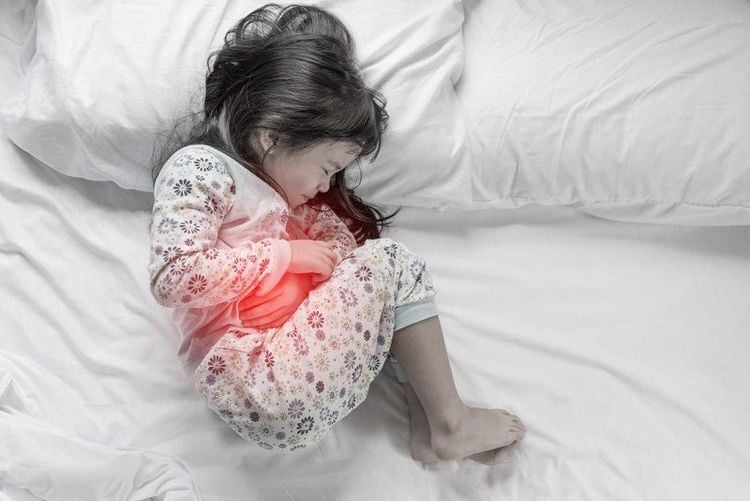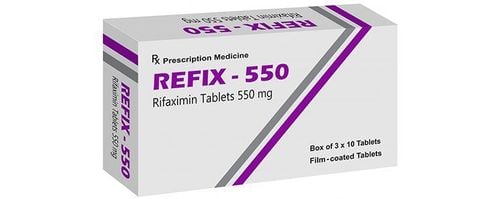This is an automatically translated article.
The article was professionally consulted with Master, Doctor Ngo Thi Oanh - Pediatrician - Department of Pediatrics - Neonatology - Vinmec Ha Long International General Hospital.Vomiting episodes in children are usually harmless and pass quickly. Common causes are stomach viruses and sometimes food poisoning. When a child vomits, what to do is a question many parents care about.
1. Causes of vomiting in children
Usually, before vomiting, children will have a feeling of nausea. However, babies who are too young can only complain of colic, fatigue, or discomfort. Babies vomit for many different reasons, depending on their age.1.1. Infants under 12 months old
At this age, it is difficult to distinguish children with regurgitation due to gastroesophageal reflux or disease. Therefore, it is necessary to take your child to the doctor for diagnosis and treatment if the child has persistent, repeated and severe vomiting.Parents should note that sometimes vomiting is also a sign of dangerous conditions such as: pyloric obstruction or stenosis, intussusception, intestinal obstruction, ... If the child vomits with fever, it is likely that the baby has been infected. an infection in the intestines or somewhere else in the body.
Trắc nghiệm: Sự phát triển tinh thần, vận động của bé thế nào là đúng chuẩn?
Khi nào bé biết nói, biết hóng chuyện hay biết cầm cốc là "đúng chuẩn"? Điểm xem bạn biết được bao nhiêu mốc phát triển tinh thần, vận động "đúng chuẩn" của bé nhé!The following content is prepared under supervision of Thạc sĩ, Bác sĩ y khoa, Ma Văn Thấm , Nhi , Phòng khám Đa khoa Quốc tế Vinmec Dương Đông(Phú Quốc)
1.2. Children over 12 months old
The most common cause is viral gastroenteritis. Vomiting usually comes on suddenly and goes away quickly within 24-48 hours. Other signs of gastroenteritis include: nausea, diarrhea, fever, or abdominal pain.Other causes can include children eating unhygienic food, holding hands or contaminated objects. When adults store or prepare food improperly, it can also cause food poisoning in children.
Older children with vomiting can also be due to: GERD, peptic ulcer, obstruction or intussusception, cyclic vomiting, respiratory tract infections, urinary tract infections, appendicitis, pancreatitis...

2. Home Remedies
2.1. Detect and treat dehydration
Children can become dehydrated faster than adults. Therefore, monitoring your child's dehydration is one of the best things parents should do when their baby is vomiting. Signs of dehydration are usually:Baby seems tired, irritated Dry mouth Less watering when crying Cold skin Sunken eyes Frequency of urinating less often than usual Urine less or darker yellow with each pass . To prevent and reduce dehydration, try to make your child drink more. Even if a child vomits continuously, his body can still absorb some of the food and drink offered. Parents can use regular filtered water, water containing electrolytes or oral rehydration solutions such as oresol. After your baby spits up, start adding a small amount of water (2 - 3 scoops every few minutes), gradually increasing the amount when the baby is no longer vomiting. During the rehydration period, it is important to pay attention to whether the baby is urinating often or not. If so, then the dehydration has shown signs of recovery.
Previously, there was a concept of using lemon soda (with no gas), salted lemon juice and ginger ale to rehydrate children. Even many doctors have recommended this method. However, recent studies show that rehydration solutions are better for children. Because these drinks provide the right amount of sugar and salt.
2.2. Eat liquid food
After a few hours since your baby's last spit up, you can start giving your baby liquid foods (the level of liquid you can see through). These foods will be easier to digest, and also have enough nutrients to provide energy to compensate after the child has vomited many times.2.3. Take medicines
Children with vomiting usually go away after a short time. Therefore, it is best for parents to stay calm and wait for the baby to vomit. Over-the-counter antiemetics are not recommended for children. Medicines should only be used in cases where the cause of vomiting is a virus of some kind. Doctors often advise parents to prioritize rehydration for their children over medication. If your child spits up repeatedly or he has severe persistent vomiting, take him to the doctor to get an appropriate medicine prescribed.3. When to call the doctor
Around the issue of what to do when a child vomits, doctors say that medical care is needed for a child with vomiting if:Under 12 weeks old and the child vomits many times There are signs of dehydration or you suspect that your baby has ingested poison Behaving unusually, or has a high fever, headache, rash, stiff neck or stomachache There is blood or bile in the vomit, or you think your baby may have appendicitis Difficulty waking up wakes up, seems sick, or has been vomiting for 8 hours straight. These are warning signs of a serious underlying condition, so parents should take their baby to see a doctor right away.
Young children often vomit, so it is not a cause for concern. Parents can refer to some ways to overcome this situation at home. It's important to see a doctor if your baby is younger than 12 weeks old, shows signs of illness and is tired, or whenever you feel anxious.
In Vietnam today, 7 out of 10 children under 5 years old have zinc deficiency and 8 pregnant women have zinc deficiency. The prevalence of zinc deficiency in pregnant women is 80.3%, women of childbearing age 63.6% and children under 5 years old is 69.4%. The most common manifestations of zinc deficiency in children are growth retardation, mild and moderate malnutrition, delayed growth in height, and some observable symptoms such as anorexia or decreased appetite, decreased suckling, and no meat. fish, slow digestion, mild constipation, persistent nausea and vomiting in children. In addition to reasonable zinc supplementation, parents also need to provide their children with other important vitamins and minerals such as lysine, chromium, B vitamins,... resistance to minor illnesses and less digestive problems.
Please visit the website vimec.com regularly and update useful information to take care of your baby and family.
Please dial HOTLINE for more information or register for an appointment HERE. Download MyVinmec app to make appointments faster and to manage your bookings easily.
Article reference source: Webmd.com













